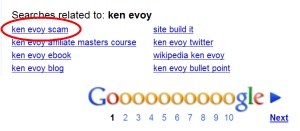Ken Evoy Scam

If you did a Google search for Ken Evoy, you might have also been shown a related search called "Ken Evoy scam."
If you pursued that suggestion and examined those results, perhaps you noticed that no pages using the exact phrase "Ken Evoy scam" were found. Instead, Google struggles to fulfill the request (that they suggest) by retrieving pages displaying the words "Ken Evoy" and "scam" anywhere on the same page. That means you are offered pages where the keywords don't even appear in the same sentence, let alone being a relevant phrase that deserves a closer look.
This suggestion then, offers false results which incidentally encompass the same players involved in the Site Build It Scam Google bomb.
It's important to remember that the "scam" search under discussion began as a suggestion by Google called "Searches related to Ken Evoy." Related searches are intended to be useful to the user by offering more information and a deeper search experience than one would otherwise have. But if you think about it, the phrase in question borders on nonsense because how can a person be a scam? A scam is a fraudulent product or service.
Why would Google suggest you find out more information about a nonsensical concept, one that doesn't even exist?
The answer to the riddle lies in orchestrated manipulation and exploitation of Google's algorithm. Unfortunately, no matter how hard Google works to eradicate spammers and black hats, there are too many people who make money by manually triggering search results using black hat search engine optimization techniques.
When black hats manipulate search results, traffic is funneled to web pages of their choosing, where black hats benefit from advertising revenue or from selling alternative services which they recommend, among other monetization models.
Besides financial gain for competitors, there are other motivations to cause false search suggestions. Those reasons range from misunderstandings to grudges, a great deal of which stems from the alarming false reports of a few. Boil it all down and the entire campaign originates from just a handful of people.
The important back story in this example is Ken Evoy, who teaches and encourages building businesses based on high ethical standards. Beginning his career as a medical doctor, he is a brilliant entrepreneur helping everyday people to build their own e-businesses. He works hard to help people become successful.
The vast majority of his customers consider Dr. Evoy to be their mentor and trusted consultant, as that is in truth, his intended role. He works tirelessly to provide the tools, training and support and to keep those facilities on the cutting edge of continuously advancing technology in a rapidly changing environment.
This makes Dr. Evoy a revered and trusted friend to many, but no matter how many tools are provided to SBI! customers, it is the individual's own drive and motivation that causes their ultimate success. SBI! makes success easier and more attainable, but it can never guarantee the outcome. It only guarantees that you can try it risk free and if you don't like it, you can get your money back.
However, despite the guarantee, a disgruntled few prefer to cast blame and misconstrue facts. This is compounded by the injection of false information and outright lies. Regardless of what the Ken Evoy "scam"-manipulators insist, the fact remains that SBI! provides verifiable proof of success and an unconditional money-back guarantee. This makes for an enthusiastic customer base that swears by Ken Evoy and his company.
Verifiable proof of results, a guarantee and resultant enthusiastic customers just don't happen for scams.





